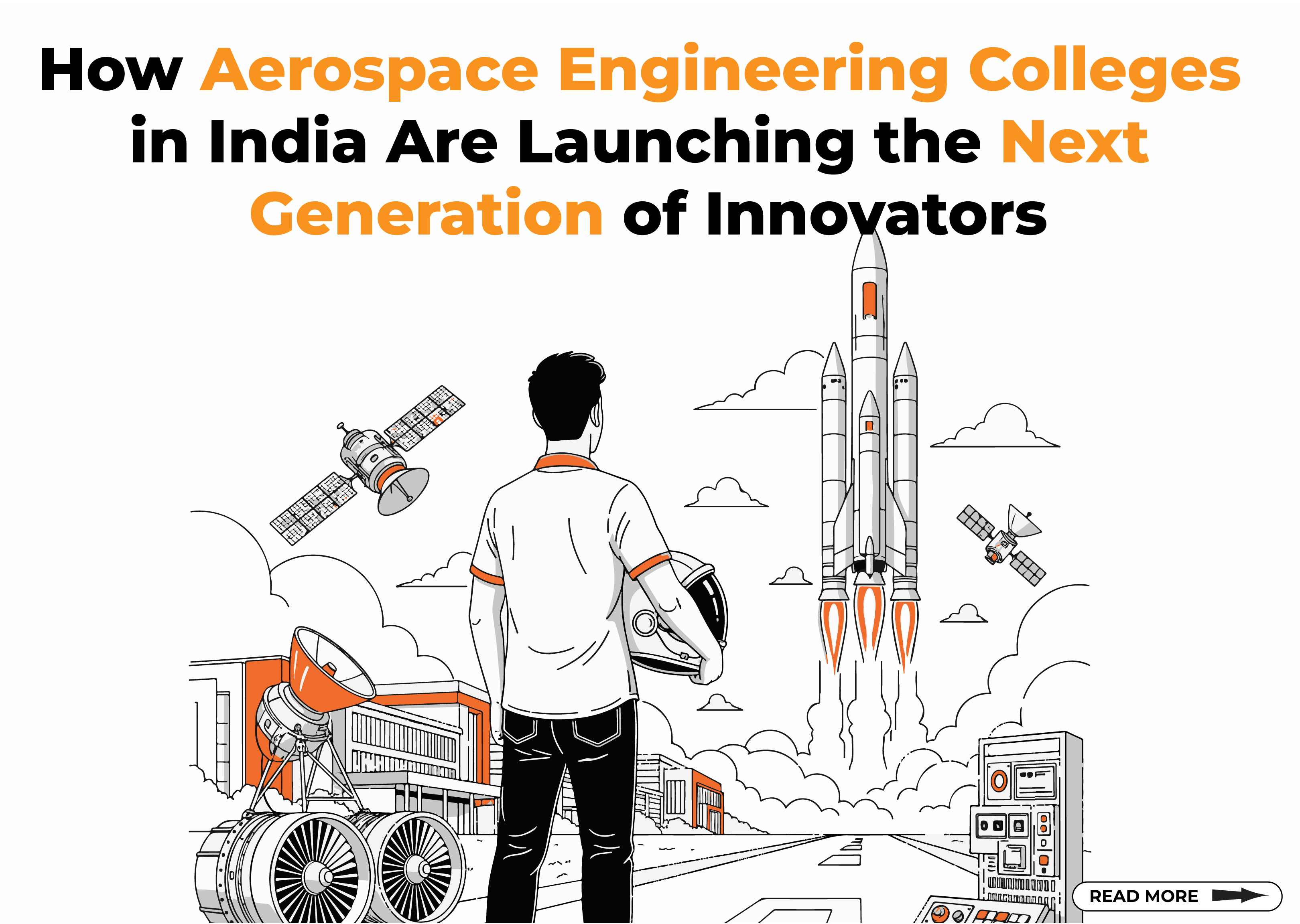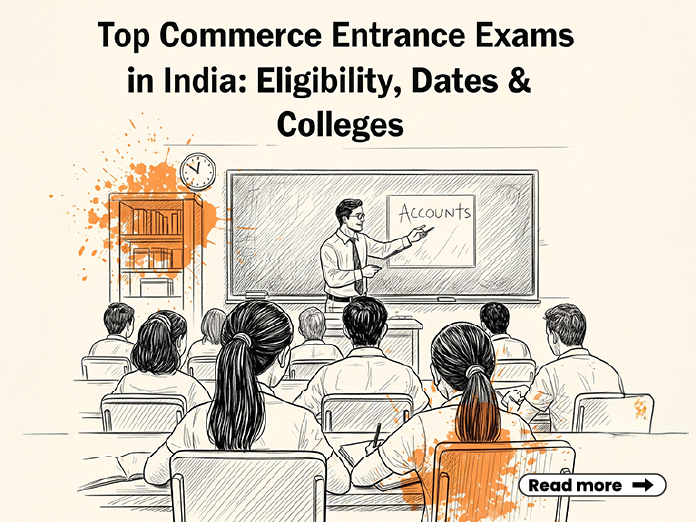It might sound ambitious, but it’s completely possible. India’s space sector has gained global attention with missions like Chandrayaan, Mangalyaan, and now Gaganyaan. These achievements did not happen in a vacuum. Strong educational foundations backed them, visionaries guided them, and young minds across Indian universities powered them.
Right now, aerospace engineering colleges in India are buzzing with innovation. Students are building satellites, simulating supersonic flight, and experimenting with drones. These campuses aren’t just educational institutions. They’re launchpads for tomorrow’s aerospace pioneers.
Let’s explore how these colleges for aerospace engineering are helping students turn sky-high dreams into real-world success.
How Did India’s Campuses Become Space-Age Hubs?
India’s journey into space started with a small satellite and a lot of hope. Today, the nation has its navigation system, interplanetary missions, and global recognition. This success didn’t come only from government agencies. It emerged from strong partnerships between research organisations and academic institutions.
Many aeronautical engineering colleges in India include strong ties with ISRO, DRDO, HAL, and private aerospace companies. These connections have developed over the years. These partnerships transformed classrooms into research hubs.
Students don’t just read about satellite design, they build and test satellite models. They don’t just imagine rocket propulsion, they work with real prototypes and simulators.
Across the country, labs are equipped with advanced tools:
- Wind tunnels for aerodynamic testing
- Flight simulation systems for hands-on training
- Propulsion test benches for engine testing.
- CAD and CAM software are used in the global technology and science industry
These facilities allow students to understand theory through experience. They work on real-time projects, participate in global contests, and even contribute to space missions.
Colleges now focus on practical exposure. Industrial visits, internships, and collaborative projects with space-tech companies are standard features in the curriculum.
These aren’t just academic spaces, they are future-ready ecosystems.
What Defines the “Best” in Aerospace Education Today?
When it comes to choosing the best aerospace engineering colleges in India, many students start with rankings. But rankings alone don’t tell the full story. What matters is how well a college prepares students for a fast-changing, high-demand industry.
Here’s what sets top colleges apart:
- Innovation Culture: The best colleges encourage students to ask questions, take risks, and create solutions. They provide platforms like aero design challenges, robotics clubs, and satellite development teams.
- Strong Alumni Network: Colleges with successful graduates often have better industry ties. Alumni who work at ISRO, Boeing, or Airbus can guide students, provide referrals, and offer mentorship.
- Industry Immersion: The top colleges for aerospace engineering in India offer hands-on internships, field visits to manufacturing units, and live project opportunities with companies like HAL and L&T.
- Cross-Disciplinary Learning: Aerospace engineering blends with AI, robotics, computer vision, and even sustainable design. Good colleges promote flexible learning with electives from other engineering courses.
- Global Exposure: Top colleges often collaborate with international universities and offer exchange programmes. These experiences give students a global perspective on aerospace trends.
Choosing a college is about more than placement records. It’s about culture, opportunities, and support systems that guide students throughout their careers.
LPU: A Launchpad for India’s Future Aerospace Engineers
Lovely Professional University (LPU) is among the institutions that are actively redefining aerospace education in India. With a focus on experiential learning and innovation-driven teaching, LPU equips students with both technical knowledge and industry exposure.
Here’s how LPU supports aspiring aerospace engineers:
- Industry-Relevant Curriculum: LPU offers a comprehensive aerospace engineering programme aligned with current global aerospace trends, including subjects like avionics, aircraft structures, propulsion systems, and UAV technology.
- Research and Innovation Labs: Students have access to modern labs, CAD/CAM facilities, and wind tunnel testing infrastructure. The university supports hands-on learning with real-life aerospace models.
- Global Tie-Ups: Through partnerships with international universities and aerospace organisations, LPU provides students with international exposure via collaborative projects and semester exchange programmes.
- Entrepreneurship Support: LPU fosters start-ups and innovations in drone technology, satellite systems, and aviation solutions through its in-house incubation centre.
- Career Pathways: Alumni from LPU’s engineering departments have gone on to work in organisations like ISRO, DRDO, and private aerospace start-ups, showcasing the university’s role in shaping space-tech careers.
LPU doesn’t just offer aerospace education, it offers a launchpad for students with sky-high ambitions.
Are You Choosing a College or a Launch Vehicle?
Picking an aerospace engineering college is like choosing a launch vehicle. A strong one propels your dreams to new heights. A mismatched one might limit your journey.
Many students make the mistake of choosing a college solely based on rank or brand name. But what matters most is alignment between your personal goals and what the college offers.
Ask yourself:
- Does the college offer research in my area of interest, like UAVs or satellite communication?
- Are there professors whose work excites me?
- Will I have access to advanced labs and real-world projects?
- Does the college support start-ups or entrepreneurship in aerospace?
- Are alumni working in my dream companies?
How Are Colleges Preparing Students for Jobs That Don’t Exist Yet?
The aerospace industry is transforming fast. A decade ago, few imagined careers in:
- Drone fleet management
- Satellite-based agriculture
- Space law
- Orbital debris clean-up
- Space tourism operations
Today, these are emerging fields. And tomorrow, there will be more.
So, how are aerospace engineering colleges in India adapting?
- Future-Focused Curriculum: Many colleges now offer electives in AI-driven aircraft maintenance, additive manufacturing, and embedded systems in aviation.
- Industry-Led Labs: Colleges partner with aerospace companies to set up labs that mirror real-world environments. Students get hands-on experience with tools used in design, testing, and manufacturing.
- Hackathons and Competitions: Platforms like Smart India Hackathon, SAE Aero Design, and international student challenges help students solve futuristic problems.
- Flexible Projects and Capstones: Colleges let students design their final-year projects based on trends. One group might build a high-altitude drone. Another may create satellite communication tools for rural healthcare.
- Soft Skills and Leadership Training: Tomorrow’s jobs will demand creativity, leadership, and collaboration. Colleges now focus on personality development and team-building exercises.
Adaptability is the skill of the future. The best aerospace engineering colleges in India train students to think beyond limits and prepare for careers that haven’t even been named yet.
Why Aerospace Isn’t Just a Career Track, It’s a National Calling?
For many young Indians, aerospace engineering isn’t just about a stable job. It’s about pride, service, and legacy.
Every successful launch by ISRO inspires a generation. Students watch the countdown and imagine themselves in mission control one day. That sense of purpose shapes career choices.
Top colleges nurture this mission-driven mindset. They remind students that innovation in aerospace can:
- Strengthen national defence
- Improve disaster management
- Enable better weather prediction
- Support rural development through satellites
- Build India’s global scientific reputation
At LPU and similar institutions, students often work on community-impact projects too. Some design UAVs to deliver medicines in remote areas. Others build model rockets for school outreach. These activities build a sense of responsibility.
The best aerospace engineering colleges in India go beyond technical training. They build citizens. They create problem-solvers who believe in India’s potential and want to contribute.
Conclusion
India’s journey to the stars is just beginning. And today’s aerospace engineering classrooms are its launchpads.
Btech in Aerospace engineering colleges in India are not just places of study. They are spaces of transformation. They combine cutting-edge labs with visionary mentorship. They offer students a platform to innovate, collaborate, and lead.
The best colleges don’t just prepare you for a job. They prepare you for a mission.
So, when you’re exploring the top 10 aerospace engineering colleges in India, look beyond brochures and rankings. Ask the deeper questions. What do you want to build? Who do you want to become?
Also, check the eligibility criteria, the available engineering courses, and the scope of collaboration with institutions like the Indian Institute of Technology. Your college journey begins with the right entrance exams, but it takes off with purpose.
The right college will align with your ambition and fuel your journey.




![Career Paths After B.Sc. Information Technology [Lateral Entry] Career Paths after B.Sc. Information Technology [Lateral Entry]](https://www.lpu.in/blog/wp-content/uploads/2026/01/Career-Paths-after-B.Sc_.-Information-Technology-Lateral-Entry-218x150.png)









